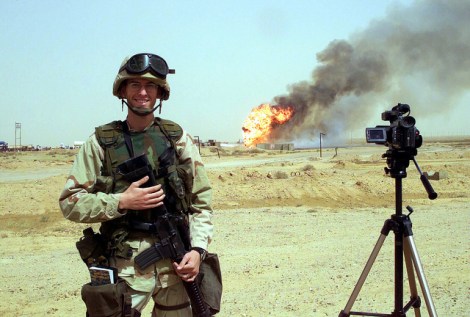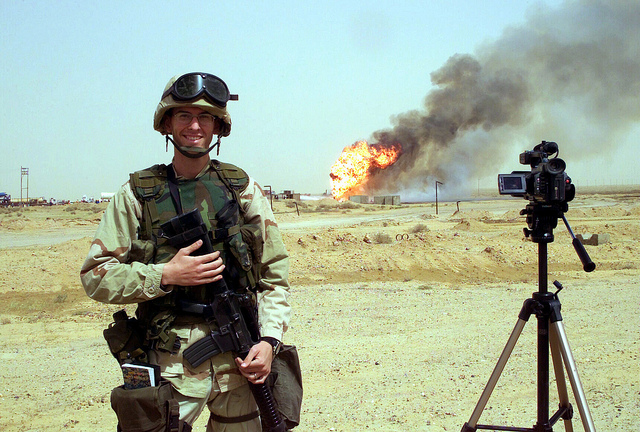
expertinfantryAn American soldier stands near a 2006 oil field fire near Kirkuk.
Tensions between the semiautonomous Kurdish region in northern Iraq and that country’s government are high — in large part thanks to oil. ExxonMobil’s recent agreement to explore drilling within Kurdish territory sparked a ferocious response from Iraq. One military officer suggested that exploration would be “a declaration of war.”
It’s no secret what prompts such fury. There’s an enormous amount of money in the Iraqi oil fields; some of those disinclined to be generous to our former president suggest that opening Iraq’s oilfields to American companies was a motive for Bush’s initial invasion of the country. Both Kurdish and Iraqi leaders would like to maintain control over those inky streams of money, reinforcing ExxonMobil’s tricky position.
Last week, ExxonMobil CEO Rex Tillerson sat down with Iraqi Prime Minister Nouri al-Maliki in an effort to repair relationships between the two. It’s an important consideration. When Chevron announced an extraction deal in Kurdistan, Iraq banned the company from exploration elsewhere. From the Associated Press:
Iraq announced the meeting between Prime Minister Nouri al-Maliki and Exxon Chairman and CEO Rex Tillerson in a brief statement following the talks in Baghdad. It offered few specifics, saying that the men discussed the company’s activities and working conditions in Iraq.
Tillerson said Exxon was eager to continue and expand its work in Iraq and “will take important decisions in this regard,” according to the statement. …
A spokesman for the Kurdish regional government, Safeen Dizayee, downplayed the significance of Monday’s meeting.
“What is important is the results of this meeting, not the meeting itself,” he said. “We have not seen any change in Exxon Mobil’s policies regarding its work in Kurdistan.”
Another recent announcement provides additional incentive for ExxonMobil to mend fences. From Agence France-Presse:
Iraq said on Sunday it has discovered deposits of crude equivalent to one billion barrels of oil after the first exploration work by state-owned firms in almost 30 years.
The deposits were found after exploration in Maysan province, in southern Iraq near the border with Iran, and could potentially make a significant addition to Baghdad’s already substantial reserves.
There’s no indication that ExxonMobil knew about the new discovery prior to Tillerson’s meeting. But it reinforces the value to the company in staying on the Iraqi government’s good side. ExxonMobil’s politics are the same in the Middle East as they are here: work with and support anyone that makes it easier to suck oil out of the ground. Civil wars are bad for business.
Update Patrick Osgood, correspondent for Iraq Oil Report, clarifies (and takes issue with) the report above.
@pbump iraq oil min announcement is misreported, regards a field that was already discovered. Field is nationalised = no Exxon involvement
— Patrick Osgood (@PatrickOsgood) January 22, 2013
@patrickosgood OK. Appreciate clarification on former. On latter, tried to be clear that Exxon convo unrelated to that find.
— Philip Bump (@pbump) January 22, 2013
@pbump iraq without looking has 143bn barrels of reserves. An extra nationalised billion could never influence any oil firm to do anything
— Patrick Osgood (@PatrickOsgood) January 22, 2013
We’re working to verify Osgood’s assertion that the billion-barrel find has been misreported.




